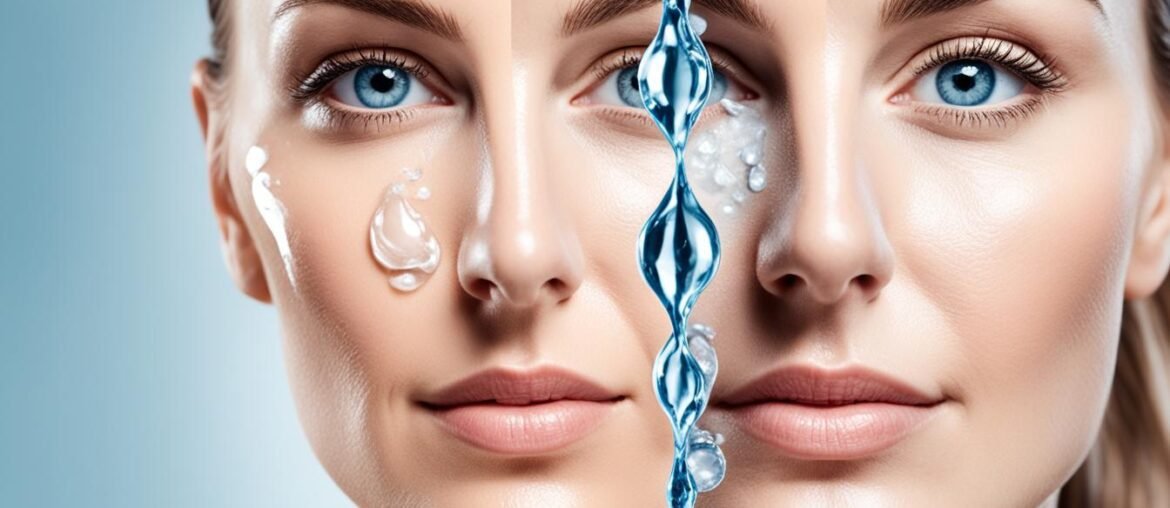Water is essential for our overall health, but its benefits extend beyond just quenching our thirst. Proper hydration plays a vital role in maintaining the health and appearance of our skin. Studies have shown that the effects of water on skin aging are undeniable, highlighting the importance of hydration for youthful and radiant skin.
As we age, our skin undergoes various changes, including decreased elasticity, thinning, and the appearance of fine lines and wrinkles. However, incorporating adequate water intake into our daily routine can help combat these signs of aging.
Throughout this article, I will delve into the benefits of water on skin health, its role in preventing skin aging, and how hydration can contribute to maintaining a youthful and vibrant complexion. We will explore how water affects skin hydration, thickness, and density, as well as its impact on blood flow and skin radiance.
Furthermore, we will address the myth that water alone can eliminate wrinkles and delve into the link between water intake and acne. I will also provide practical tips and best practices for skin hydration to help you achieve and maintain healthier skin.
By the end of this article, you will have a comprehensive understanding of how water consumption can positively affect your skin’s health and appearance, empowering you to make informed decisions about your skincare routine.
Key Takeaways:
- The effects of water on skin aging are significant and should not be underestimated.
- Proper hydration plays a vital role in maintaining a youthful and radiant complexion.
- Water intake impacts skin hydration, thickness, and density, as well as blood flow and skin radiance.
- Water alone is not a miracle remedy for wrinkles, but it contributes to overall skin health.
- A holistic approach to skincare, including adequate water intake and moisturization, is crucial for maintaining skin elasticity and preventing premature aging.
The Role of Water in Maintaining Skin Hydration
The outermost layer of the skin, known as the stratum corneum, plays a crucial role in maintaining skin hydration and preventing dehydration. This layer acts as a barrier that helps to prevent excessive water evaporation from the body. It works by sealing in moisture and ensuring that the skin retains its hydration levels.
Additionally, the cells in the stratum corneum have the ability to absorb water, contributing to skin hydration. When we consume an adequate amount of water, it helps to ensure that the outermost layer of the skin contains enough water to maintain its elasticity and bounce back when pressed. This is why well-hydrated skin appears plump and healthy.
Water is essential for maintaining the overall health of our skin. It not only hydrates the skin but also helps to improve its elasticity and texture. By ensuring that our skin remains hydrated, we can prevent dryness, flakiness, and other common skin concerns.
“Hydrated skin is healthy skin, and water is the key to achieving and maintaining optimal skin hydration.”
Proper hydration helps to create a protective barrier on the skin, preventing moisture loss and keeping the skin supple and smooth. It also helps to improve blood circulation to the skin, ensuring that it receives essential nutrients and oxygen for a vibrant and radiant appearance.
In addition to drinking enough water, there are other ways to maintain skin hydration. Using moisturizers and skincare products that contain hydrating ingredients can help lock in moisture and provide long-lasting hydration. It is also important to avoid excessive sun exposure and harsh skincare products that can strip the skin of its natural oils.
The Benefits of Water for Skin Hydration:
- Prevents dehydration and maintains skin moisture levels
- Improves skin elasticity and promotes a youthful appearance
- Enhances the skin’s natural protective barrier
- Increases blood flow to the skin, improving overall skin health
- Helps to flush out toxins, improving skin radiance
By understanding the role of water in maintaining skin hydration, we can take proactive steps to keep our skin healthy and well-nourished. Ensuring that we drink enough water and follow a proper skincare routine will help us achieve and maintain a radiant and youthful complexion.
| Benefits of Proper Skin Hydration | How Water Helps |
|---|---|
| Prevents dryness and flakiness | Water hydrates the skin and prevents moisture loss. |
| Improves skin elasticity | Adequate water intake helps maintain the skin’s elasticity. |
| Promotes a radiant and healthy complexion | Water flushes out toxins and improves blood flow to the skin. |
The Impact of Water Intake on Skin Thickness and Density
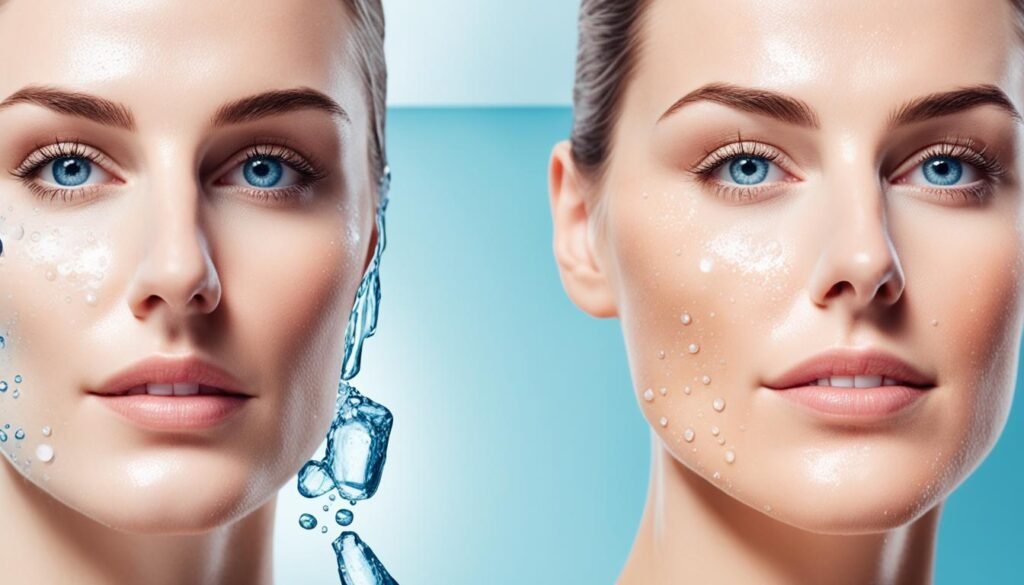
Proper hydration is not only essential for maintaining skin hydration, but it can also have a significant impact on skin thickness and density. Research studies have examined the effects of water intake on skin health and have found compelling evidence supporting the relationship between water consumption and skin quality.
One key finding from these studies is that increasing water intake can lead to an increase in skin thickness. This is particularly evident in individuals who had low water intake prior to the study. By drinking an adequate amount of water each day, these individuals experienced an improvement in skin density, making it less prone to sagging and wrinkles.
When we are dehydrated, our skin becomes dry and less elastic, which can result in a thin and fragile appearance. By maintaining proper hydration levels through adequate water intake, our skin becomes more resilient and has better support structure, giving it a healthier and plumper appearance.
Additionally, water intake can also affect skin density by improving the water content in the skin. Our skin cells have the ability to absorb water, contributing to the overall hydration and thickness of the skin. When we are well-hydrated, our skin cells are better able to retain moisture, resulting in a more supple and nourished complexion.
In summary, maintaining a balanced water intake can have a positive impact on skin thickness and density. Hydrated skin is more resilient, less prone to sagging, and has a healthier appearance overall. Incorporating proper hydration practices into our daily routine, alongside other skincare measures, can contribute to achieving and maintaining optimal skin health.
Water’s Effect on Blood Flow and Skin Radiance
Research has shown that drinking water can have a positive impact on blood flow to the skin, leading to improved skin radiance. When we stay hydrated, our blood becomes more fluid, allowing it to flow more easily throughout the body, including the skin.
This increased blood flow brings essential nutrients and oxygen to the skin cells, promoting a healthy complexion and enhancing its natural radiance. The improved circulation also aids in the removal of toxins from the skin, contributing to its overall health and glow.
While water intake alone may not eliminate wrinkles or shrink pores, it is an essential component in achieving and maintaining a healthy and radiant skin tone. Hydrating from within can help improve skin texture, tone, and radiance, giving you a more youthful and vibrant appearance.
Furthermore, drinking water can provide a temporary plumping effect to the skin, making fine lines and wrinkles less noticeable. Hydrated skin appears smoother and more supple, giving it a youthful and rejuvenated appearance.
It’s important to note that water intake should complement a comprehensive skincare regimen that includes other beneficial practices such as using moisturizers, protecting the skin from harmful UV rays, and maintaining a healthy lifestyle.
By incorporating water into your daily routine and adopting these best practices, you can enhance your skin’s radiance, improve its overall health, and achieve a youthful and glowing complexion.
The Importance of Moisturizers and Overall Skin Health
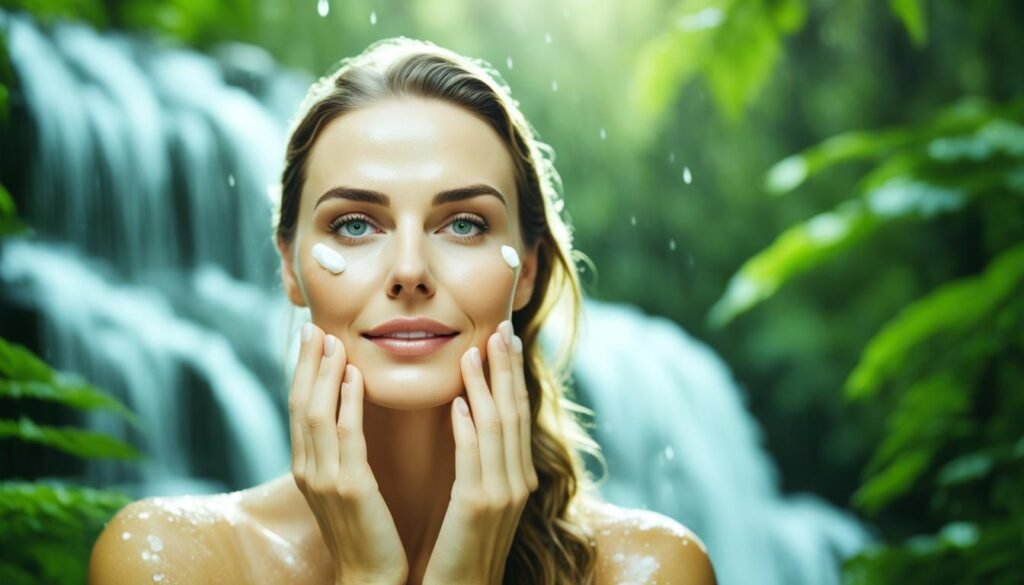
While water intake is essential for skin health, it is not a magic solution for all skin concerns. Moisturizers play a crucial role in restoring and maintaining skin hydration. They help replenish moisture in the skin and improve its overall elasticity. In combination with a healthy lifestyle, including drinking enough water, limiting alcohol consumption, not smoking, and improving nutrition, moisturizers can contribute to healthier and more youthful-looking skin.
“Moisturizers help restore and maintain the skin’s natural moisture barrier, preventing water loss and keeping the skin hydrated. They provide necessary nourishment, help protect the skin from environmental damage, and improve its overall texture and appearance.”
Choosing the right moisturizer for your skin type is crucial. Look for products that contain ingredients such as hyaluronic acid, glycerin, ceramides, and antioxidants. These ingredients help attract and retain moisture, improve skin barrier function, and protect against free radicals.
Moisturizers are particularly beneficial for improving skin elasticity. As we age, the skin loses its ability to retain moisture and becomes drier, leading to a loss of elasticity and the formation of fine lines and wrinkles. By using moisturizers regularly, you can help keep your skin hydrated, supple, and firm.
Furthermore, moisturizers are not only important for the face but for the entire body. Applying moisturizers after showering or bathing helps lock in moisture and maintain the skin’s natural balance.
Remember, moisturizers are not a substitute for drinking water. While they provide external hydration, it’s essential to stay hydrated from within by consuming an adequate amount of water daily.
In conclusion, incorporating moisturizers into your skincare routine is essential for maintaining overall skin health. They play a vital role in restoring and maintaining skin hydration, improving elasticity, and promoting a more youthful appearance. Combined with proper hydration and a holistic approach to skincare, moisturizers can help you achieve healthy, radiant skin.
Debunking the Myth: Water as a Wrinkle Remedy
Despite popular belief, drinking more water does not directly eliminate wrinkles or make pores smaller. Wrinkles and fine lines are often the result of aging, collagen and elastin breakdown, and decreased skin density. Proper hydration can improve skin elasticity and prevent sagging, but it cannot reverse the natural aging process. Moisturizers and other skincare products specifically designed to target wrinkles and fine lines are more effective in addressing these concerns.
In reality, water alone cannot magically erase wrinkles or make them disappear. Wrinkles occur as a natural part of the aging process, as the skin’s collagen and elastin fibers break down over time. While drinking enough water is important for overall skin health and hydration, it is not a direct remedy for wrinkles.
“Drinking water does not have a direct impact on wrinkles. While proper hydration is crucial for maintaining skin health, there are other factors to consider when addressing wrinkles.”
– Dr. Jane Carter, Dermatologist
Moisturizers and other skincare products specifically formulated to target wrinkles and fine lines are more effective in reducing their appearance. These products contain ingredients like retinol, hyaluronic acid, and peptides, which help stimulate collagen production, improve skin texture, and plump up fine lines.
It’s important to emphasize that properly hydrating the skin plays a role in maintaining its elasticity and preventing dryness, which can accentuate the appearance of wrinkles. However, relying solely on water intake to eliminate wrinkles is a misconception.
The Role of Water in Skin Hydration
While water consumption alone may not directly eliminate wrinkles, it does play a crucial role in maintaining skin hydration. When the body is properly hydrated, it helps support the skin’s natural barrier function, preventing excessive water loss and promoting moisture retention.
Debunking the Myth with Facts
Let’s explore the common myths about water eliminating wrinkles and debunk them with scientific facts:
| Myth | Fact |
|---|---|
| Drinking more water will make wrinkles disappear. | Water intake cannot eliminate wrinkles. Wrinkles are a natural part of aging and require targeted skincare approaches. |
| Water makes pores smaller. | Water alone cannot shrink pore size. Pore size is determined by genetics and other factors, and topical treatments are needed to address enlarged pores. |
| Increasing water intake will instantly improve skin texture. | While hydration is essential for healthy skin, other factors such as genetics, lifestyle, and skincare routine also play a significant role in skin texture. |
It’s crucial to understand that water consumption is necessary for overall well-being, including skin health. However, it is not a miracle remedy for wrinkles. To effectively address wrinkles, turn to skincare products and treatments specifically designed to target these concerns.
The Link Between Water Intake and Acne
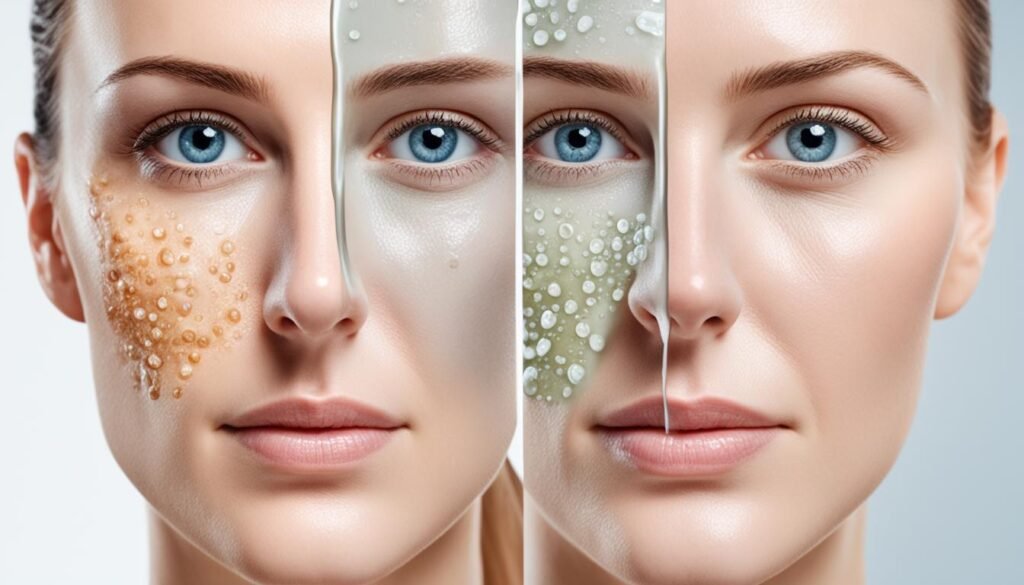
Some individuals have reported improvements in acne symptoms after increasing their water intake. While the direct link between water consumption and acne is not fully understood, proper hydration can help flush out toxins and improve overall skin health. Drinking enough water, along with a balanced skincare routine, can contribute to a clearer complexion. However, it is important to note that acne is a complex skin condition with various causes, and water intake alone may not be the solution for everyone.
Acne, a common skin condition characterized by pimples, blackheads, and whiteheads, can be influenced by various factors such as hormones, genetics, and lifestyle. While water intake alone may not directly prevent or cure acne, staying hydrated is still important for overall skin health.
“Proper hydration can help flush out toxins and improve overall skin health.”
When the body is not adequately hydrated, it may compensate by producing more oil, which can contribute to clogged pores and acne breakouts. By drinking enough water, you can help maintain the balance of oil production and reduce the likelihood of acne flare-ups.
Furthermore, water plays a vital role in the detoxification process. It helps flush toxins out of the body, which can indirectly benefit the skin by reducing inflammation and promoting a healthier complexion. When the body is well-hydrated, it can effectively eliminate waste products, including those that contribute to skin issues like acne.
While water intake is a valuable component of a comprehensive skincare routine, it should be complemented by other acne-fighting strategies. This may include using gentle cleansers, avoiding harsh skincare products, practicing good hygiene, and maintaining a balanced diet.
Summary:
Increasing water intake may have positive effects on acne symptoms by promoting skin health and detoxification. However, it is important to remember that acne is a complex condition with multiple factors at play. While drinking enough water is beneficial for overall skin health, it is not a guaranteed cure for acne. It should be coupled with appropriate skincare practices and lifestyle habits for optimal results.
Best Practices for Hydrating Your Skin
To keep your skin hydrated, it is important to adopt a holistic approach. Along with increasing your water intake, use moisturizers immediately after showering when the skin is still porous and absorbent. This allows for better penetration and retention of moisture. Additionally, practicing overall good skincare habits such as wearing sunscreen, improving nutrition, and avoiding smoking and excessive alcohol consumption can all contribute to healthier and more hydrated skin.
| Best Practices for Skin Hydration |
|---|
| Tips for Hydrating the Skin |
| Moisturizing for Improved Skin Hydration |
| Maintaining Skin Health with Hydration |
The Impact of Water Intake on Skin Elasticity
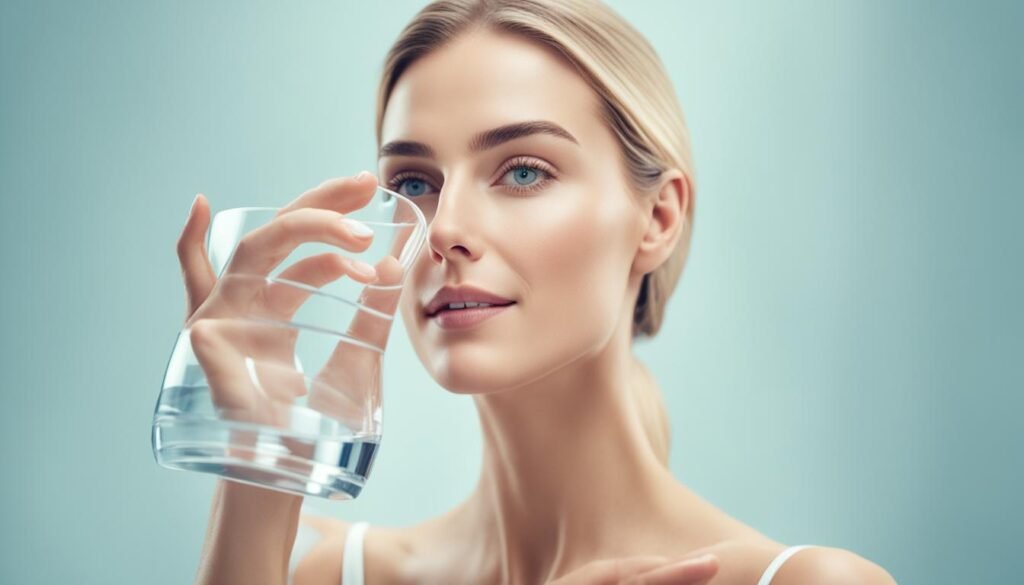
Adequate water intake plays a vital role in maintaining the elasticity of our skin. As we age, the natural decrease in collagen and elastin leads to decreased skin density and firmness, resulting in sagging and wrinkles. However, by ensuring proper hydration, we can help combat these effects and promote more supple and youthful-looking skin.
Hydrated skin has improved elasticity, allowing it to bounce back more effectively when pressed. This increased resilience helps to prevent the formation of fine lines and wrinkles. When our skin is well-hydrated, it appears plump and healthy, giving it a more youthful and vibrant appearance.
While water intake alone may not completely solve all elasticity concerns, it is a crucial component of a comprehensive skincare routine. By combining hydration with other skincare practices, such as using moisturizers and protecting the skin from harmful UV rays, we can better maintain the elasticity and firmness of our skin.
The Role of Moisturizers
In addition to water intake, the use of moisturizers is essential for maintaining skin elasticity. Moisturizers help to replenish the skin’s moisture barrier and improve overall hydration. By providing the skin with the necessary moisture it needs, moisturizers enhance its elasticity and firmness.
Moisturizers play a crucial role in restoring and maintaining skin hydration, improving elasticity and keeping the skin supple.
Using a moisturizer immediately after showering is particularly effective, as the skin is still porous and absorbent. This allows the moisturizer to penetrate deeply and provide long-lasting hydration. Additionally, it is important to choose a moisturizer that is appropriate for your skin type and contains ingredients that promote skin elasticity, such as hyaluronic acid or peptides.
Protection from UV Damage
Protecting the skin from harmful UV rays is another important aspect of maintaining skin elasticity. Prolonged exposure to the sun’s ultraviolet radiation can accelerate collagen and elastin breakdown, leading to a loss of skin elasticity.
Wearing broad-spectrum sunscreen with a high SPF every day, even on cloudy days, helps shield the skin from UV damage. Additionally, seeking shade during peak sun hours and wearing protective clothing, such as hats and long sleeves, can further minimize UV exposure.
Summary
Proper hydration through adequate water intake is crucial for maintaining skin elasticity and preventing premature aging. While water alone may not solve all elasticity concerns, when combined with moisturizers and UV protection, it can significantly contribute to the overall health and appearance of our skin.
Conclusion
In conclusion, the impact of water on skin health cannot be overstated. Adequate hydration is essential for maintaining a youthful and radiant complexion. Water helps to keep the skin hydrated, improving its overall tone and radiance. It also plays a crucial role in increasing skin density and thickness, making it less prone to sagging, fine lines, and wrinkles.
While water intake is vital, it is important to remember that it is not a magic solution for all skin concerns. It should be complemented by proper skincare practices, including the regular use of moisturizers and adopting a healthy lifestyle. Moisturizers help restore and maintain skin hydration, while lifestyle choices such as limiting alcohol consumption, avoiding smoking, and improving nutrition contribute to healthier and more youthful-looking skin.
Therefore, to promote optimal skin health and prevent premature aging, it is crucial to prioritize hydration and follow a holistic skincare routine. By combining the benefits of water intake with the use of moisturizers and adopting a healthy lifestyle, individuals can maintain the elasticity, firmness, and overall health of their skin for a vibrant and youthful appearance.
FAQ
What are the effects of water on skin aging?
Water plays a crucial role in maintaining skin health and preventing premature aging. Good hydration helps to keep the skin hydrated, improve overall tone and radiance, and increase skin density and thickness.
How does water maintain skin hydration?
Adequate water intake ensures that the outermost layer of the skin contains enough water, allowing the skin to maintain its elasticity and bounce back when pressed. It also helps prevent excessive water evaporation from the skin.
Does water intake affect skin thickness and density?
Yes, studies have shown that increasing water intake can lead to increased skin thickness, particularly in individuals with low water intake. This suggests that proper hydration can improve skin density and reduce the risk of sagging and wrinkles.
Does water improve blood flow and skin radiance?
Yes, drinking water increases blood flow to the skin, bringing oxygen and nutrients that promote a healthy complexion. Improved blood flow can contribute to a more radiant appearance and flush out toxins, enhancing skin health and radiance.
Are moisturizers important for skin health?
Yes, moisturizers play a crucial role in restoring and maintaining skin hydration. They help replenish moisture, improve overall elasticity, and contribute to healthier and more youthful-looking skin.
Can drinking more water eliminate wrinkles?
While water intake can improve skin elasticity and prevent sagging, it does not directly eliminate wrinkles or make pores smaller. Collagen breakdown, elastin loss, and decreased skin density are the primary causes of wrinkles. Moisturizers and targeted skincare products are more effective in addressing these concerns.
Is there a link between water intake and acne?
Some individuals have reported improvements in acne symptoms after increasing their water intake. Proper hydration helps flush out toxins and improve overall skin health, contributing to a clearer complexion. However, acne is a complex skin condition with various causes, and water intake alone may not be the solution for everyone.
What are the best practices for hydrating the skin?
To keep your skin hydrated, increase your water intake, use moisturizers immediately after showering, wear sunscreen, improve nutrition, and avoid smoking and excessive alcohol consumption.
How does water intake impact skin elasticity?
Adequate water intake is essential for maintaining skin elasticity. Hydrated skin is more supple and less prone to sagging and wrinkles. Combined with other skincare practices, such as using moisturizers and protecting the skin from UV rays, water intake helps maintain skin elasticity and promotes a more youthful appearance.

